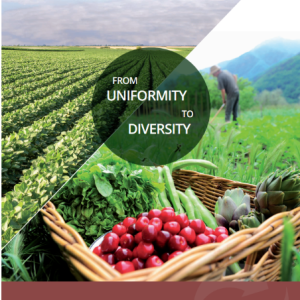
The iPES food panel (International Panel of Experts on Sustainable Food Systems), has published a report reviewing the latest evidence on benefits and challenges with different production models, specifically looking at the industrial agriculture and agroecological farming systems. It argues that there are eight key reasons why industrial agriculture is locked in place despite its negative impacts; and it maps out a series of steps to break these cycles and shift towards expanding agroecological farming.
The panel of experts concludes that a fundamental shift towards diversified agroecological farming can deliver simultaneous benefits for productivity, the environment and society and identifies industrial agriculture as a key contributor to the most urgent problems in food systems: a) Food systems contribute around 30% of global greenhouse gas emissions; b) Around 20% of land on earth is now degraded; c) More than 50% of human plant-derived foods now depend on three crops (rice, maize and wheat); d) 20% of livestock breeds are at risk of extinction; e) The extinction of wild species and the application of insecticides threaten the 35% of global crops dependent on pollination; f) Around 2 billion people suffer from micronutrient deficiencies; current food systems produce an abundance of energy-rich, nutrient-poor crops.
The key messages of the report are as follows:
- Today’s food and farming systems have succeeded in supplying large volumes of foods to global markets, but are generating negative outcomes on multiple fronts: widespread degradation of land, water and ecosystems; high GHG emissions; biodiversity losses; persistent hunger and micro-nutrient deficiencies alongside the rapid rise of obesity and diet-related diseases; and livelihood stresses for farmers around the world.
- Many of these problems are linked specifically to ‘industrial agriculture’: the input-intensive crop monocultures and industrial-scale feedlots that now dominate farming landscapes. The uniformity at the heart of these systems, and their reliance on chemical fertilizers, pesticides and preventive use of antibiotics, leads systematically to negative outcomes and vulnerabilities.
- Industrial agriculture and the ‘industrial food systems’ that have developed around it are locked in place by a series of vicious cycles. For example, the way food systems are currently structured allows value to accrue to a limited number of actors, reinforcing their economic and political power, and thus their ability to influence the governance of food systems.
- Tweaking practices can improve some of the specific outcomes of industrial agriculture, but will not provide long-term solutions to the multiple problems it generates.
- What is required is a fundamentally different model of agriculture based on diversifying farms and farming landscapes, replacing chemical inputs, optimizing biodiversity and stimulating interactions between different species, as part of holistic strategies to build long-term fertility, healthy agro-ecosystems and secure livelihoods, i.e. ‘diversified agroecological systems’.
- There is growing evidence that these systems keep carbon in the ground, support biodiversity, rebuild soil fertility and sustain yields over time, providing a basis for secure farm livelihoods.
- Data shows that these systems can compete with industrial agriculture in terms of total outputs, performing particularly strongly under environmental stress, and delivering production increases in the places where additional food is desperately needed. Diversified agroecological systems can also pave the way for diverse diets and improved health.
- Change is already happening. Industrial food systems are being challenged on multiple fronts, from new forms of cooperation and knowledge-creation to the development of new market relationships that bypass conventional retail circuits.
- Political incentives must be shifted in order for these alternatives to emerge beyond the margins. A series of modest steps can collectively shift the centre of gravity in food systems.
Citation
IPES-Food. (2016). From uniformity to diversity: a paradigm shift from industrial agriculture to diversified agroecological systems. International Panel of Experts on Sustainable Food systems.
Read the full report here and see a press release here. The executive summary is available here.
You can find further resources related to agroecology, sustainable food security and production efficiency/intensity in our research library.







Post a new comment »